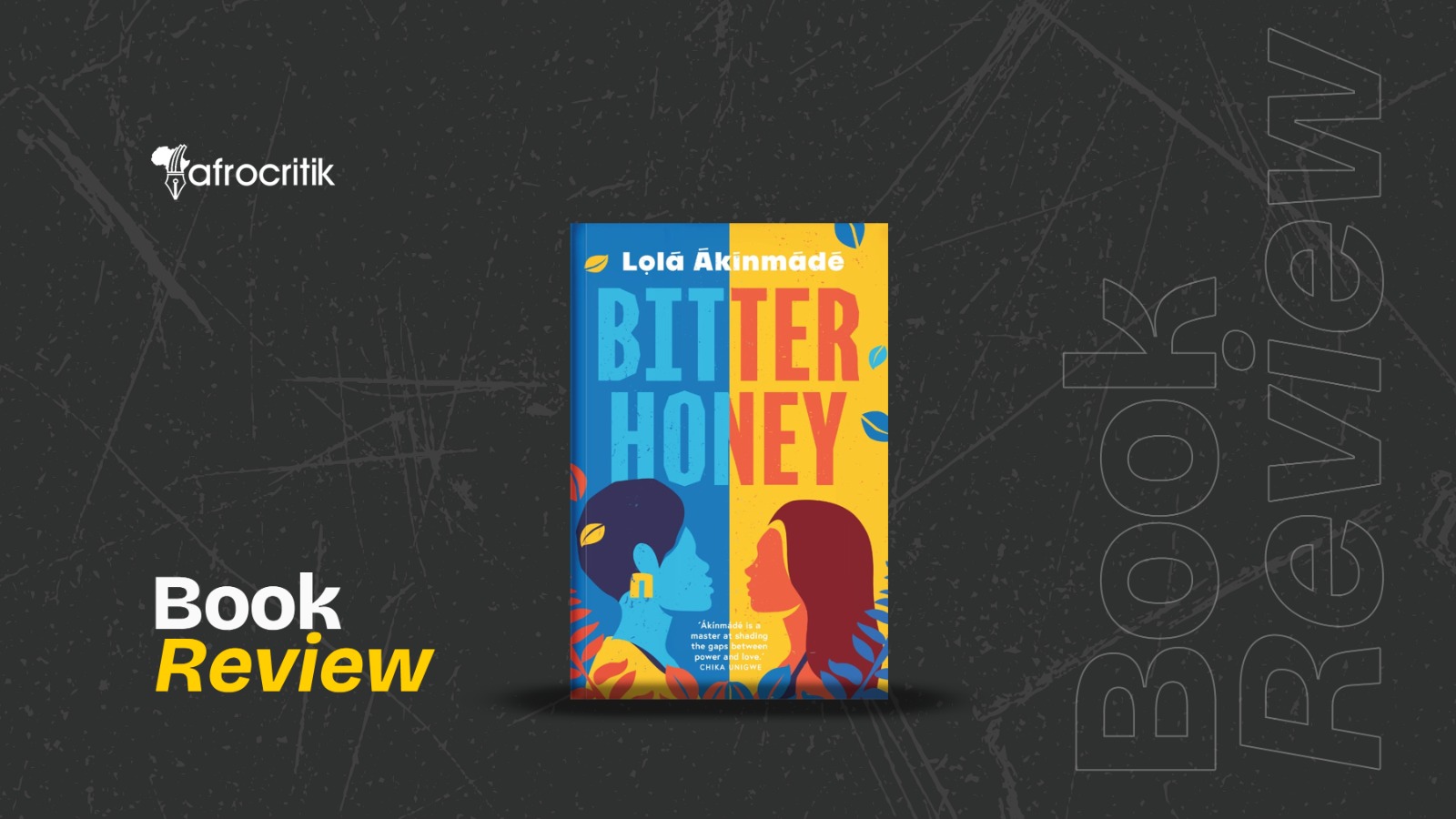If Bitter Honey has an answer to an unasked question, it is that in this tender, unsettling novel, bitterness does not cancel sweetness but rather makes it real.
By Evidence Egwuono Adjarho
“She wonders how the sizzling-hot iron would feel against her eyes. Would it first peel off the skin surrounding them? Would her irises melt into something viscous like honey and her pupils into black tar?” are the opening sentences in Lọlá Ákínmádé Åkerström’s Bitter Honey.
These simultaneously arrest the reader and unsettle them. It signals psychological unease and impending emotional rupture. And true to its promise, the unease embedded in the opening sentences quickly unfurls across the pages of Bitter Honey.
On her twentieth birthday and in preparation for the biggest night of her career, “a chance to win Sweden’s beloved Melodifestivalen music competition”, Tina sees “a middle-aged male version of herself” who claims to be her father, a man she had erstwhile thought dead. The plot is woven around both the past and the present, through the lives of two generations of women, in unraveling the ties and connections to this first scene.

In Bitter Honey, Lọlá Ákínmádé Åkerström turns her luminous gaze once again toward the emotional interiorities of Black women navigating love, longing, and selfhood in unfamiliar worlds. The title is metaphoric. Honey is sustenance, memory, a tenderness women are expected to produce endlessly; and the bitterness is the cost: the emotional bruising, and the erosion of self that devotion can demand. The novel then asks what it means to pick oneself up in spite of the bruises.
The events in Bitter Honey unfold through the intertwined lives of Nancy and Tina, mother and daughter. In the late 1900s, Nancy, a young woman of Gambian descent, arrived in Sweden on a scholarship. With only her aunt, Yaya, and her husband, Benke, as familiar faces, Sweden quickly proves cold, isolating, and unwelcoming. She clings to companionship wherever she can find it, forming a swift bond with Malik, the only other African student in her class. Their friendship grows easily.
At the same time, she becomes increasingly drawn to her professor, Lars, who speaks Wolof and Mandinka fluently—a bridge to home she did not expect in Sweden. Despite a twenty-year age gap, Lars eagerly pursues a connection with her and openly disapproves of her relationship with Malik. Against her better judgment, Nancy’s loneliness nudges her toward him, and their relationship deepens.
Bitter Honey does not follow a linear path. Nancy’s past is braided with Tina’s present, each chapter moving between their timelines. The book opens with Lars’s sudden re-entry into Tina’s life, claiming to be the father she had always believed was dead — a story Nancy had long maintained. Tina tries to reject this revelation, but their physical resemblance leaves little room for denial.
Shocked and betrayed, she confronts her mother publicly. Nancy admits the truth with unsettling calm, and the scandal quickly becomes public. Almost overnight, Tina’s image as a beloved Swedish singer is shaken; the same nation that celebrated her now scrutinizes her. She must navigate the fallout of public judgement, racial discrimination, personal shame, and the emotional wreckage left by both a lying mother and an absent father.

Though Bitter Honey shares a fictionverse with Akinmade’s previous novels, In Every Mirror She’s Black and Everything Is Not Enough, it is not a continuation of the series. Instead, characters who once hovered at the periphery, namely Nancy, Tina, and Tobias, are now brought to the forefront. Through them, the novel examines generational trauma and the emotional inheritance passed from mother to daughter.
Nancy’s once-burning ambition to become Gambia’s first female president collapses when an unexpected pregnancy derails her academic future. What torments her most is how much her daughter resembles the man who altered her life’s course.
Unable to disentangle Tina from Lars in her mind, Nancy withdraws emotionally, loving her child from a distance she cannot bridge. Tina grows up sensing this absence and craving the love she never received. In adulthood, she seeks validation and affection from men, repeating the very patterns that wounded her mother.
Messiness is not new in Akinmade’s work, and here again, the characters in Bitter Honey are human in their contradictions and vulnerabilities. The romance between Nancy and her professor, Lars, is perhaps the most difficult to stomach.
Nancy, aching for warmth in a foreign land, slips into the orbit of an obsessive lover who will do anything to possess her. She sees the signs as much as we do: “She feels heat on her skin. She turns. Lars’s eyes are on her… his eyes slowly make their way down her sleeveless shoulder. He lingers over her curves…” But loneliness is a quiet persuader, and sometimes choosing wrong feels easier than choosing to be alone. And so, the line she swore she wouldn’t cross with her professor blurs first, then disappears.
For a reader familiar with the disturbing realities of faculty-student dynamics in Nigerian universities, where abuse of power and sexual exploitation are disturbingly common, the pairing is unsettling to the point of revulsion.

Perhaps it is my bias, but even within the fictional world, the relationship felt wrong, and the book does not try to tidy this up. In fact, it is this messiness that draws us in; that leaves us pondering the weight of Emily Dickinson’s oft-quoted lines in the book: “The heart wants what it wants or else it does not care.”
There is also a historical pulse running through the novel. Åkínmádé touches on the political unrest in Gambia in the late 1900s, captured through Nancy’s estranged brother, Lamin, who is pulled into the violence of a coup and never returns. At the same time, Sweden grapples with its own political tension, heightened following the assassination of Prime Minister Olof Palme (a real-life incident, mind you).
Truly, we see through this that the individual is not removed from their immediate society. Moreover, these events affect Nancy’s life. The death of the prime minister also mirrors the end of her political ambitions.
This novel is not one that wraps itself up neatly. The ending is open and offers nearly no form of catharsis. If Bitter Honey has an answer to an unasked question, it is that in this tender, unsettling novel, bitterness does not cancel sweetness but rather makes it real.
Evidence Egwuono Adjarho is an evolving creative with a flair for various arts expressions.



